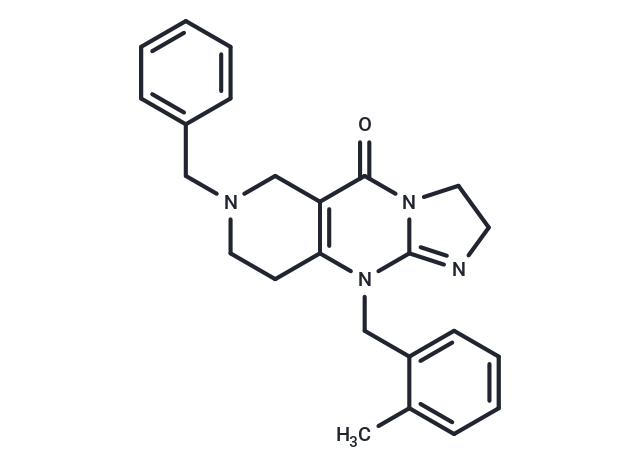Shopping Cart
- Remove All
 Your shopping cart is currently empty
Your shopping cart is currently empty

TIC10 Isomer (ONC201 isomer) is an isomer of TIC10, which inactivates Akt and ERK to induce TRAIL through Foxo3a, possesses superior drug properties: delivery across the blood-brain barrier, superior stability and improved pharmacokinetics. Phase 1/2.

| Pack Size | Price | Availability | Quantity |
|---|---|---|---|
| 5 mg | $41 | In Stock | |
| 10 mg | $58 | In Stock | |
| 25 mg | Inquiry | In Stock | |
| 50 mg | Inquiry | In Stock | |
| 1 mL x 10 mM (in DMSO) | $43 | In Stock |
| Description | TIC10 Isomer (ONC201 isomer) is an isomer of TIC10, which inactivates Akt and ERK to induce TRAIL through Foxo3a, possesses superior drug properties: delivery across the blood-brain barrier, superior stability and improved pharmacokinetics. Phase 1/2. |
| In vitro | TIC10 causes a dose-dependent increase in TRAIL mRNA and induces TRAIL protein localization on the cell surface of several cancer cell lines in a p53-independent manner. TIC10 has broad-spectrum activity against multiple malignancies in vitro and induces an increase in sub-G1 DNA content suggestive of cell death in TRAIL-sensitive HCT116 p53?/? cells, but does not alter the cell cycle profiles of normal fibroblasts at equivalent doses. TIC10 decreases the clonogenic survival of cancer cell lines and spares normal fibroblasts. TIC10 increases the percentage of sub-G1 DNA in cancer cells in a p53-independent and Bax-dependent manner, as previously reported for TRAIL-mediated apoptosis. TIC10-induced TRAIL up-regulation is Foxo3a-dependent, which also up-regulates TRAIL death receptor DR5 among other targets, potentially allowing for sensitization of some TRAIL-resistant tumor cells. TIC10 inactivates kinases Akt and extracellular signal–regulated kinase (ERK), leading to the translocation of Foxo3a into the nucleus, where it binds to the TRAIL promoter to up-regulate gene transcription. TIC10 is an efficacious antitumor therapeutic agent that acts on tumor cells and their microenvironment to enhance the concentrations of the endogenous tumor suppressor TRAIL. [1] |
| In vivo | TIC10 and TRAIL treatment causes tumor regression in the HCT116 p53?/? xenograft to a comparable extent when both are administered as multiple doses. TIC10 also induces regression of MDA-MB-231 human triple-negative breast cancer xenografts, whereas TRAIL-treated tumors progressed. In DLD-1 colon cancer xenografts, TIC10 induces tumor stasis at 1 week after treatment, whereas TRAIL-treated tumors progresses after a single dose. A single dose of TIC10 also induces a sustained regression of the SW480 xenograft and is equally effective when delivered by intraperitoneal or oral route, suggesting favorable oral bioavailability for TIC10. TIC10 causes tumor-specific cell death by TRAIL-mediated direct and bystander effects. TIC10 is an effective antitumor agent against orthotopic human glioblastoma multiforme tumors. [1] |
| Alias | TIC10 Analogue, ONC201 isomer |
| Molecular Weight | 386.49 |
| Formula | C24H26N4O |
| Cas No. | 41276-02-2 |
| Smiles | Cc1ccccc1CN1C2=NCCN2C(=O)C2=C1CCN(Cc1ccccc1)C2 |
| Relative Density. | 1.24g/cm3 |
| Storage | Powder: -20°C for 3 years | In solvent: -80°C for 1 year | Shipping with blue ice. | |||||||||||||||||||||||||
| Solubility Information | H2O: < 1 mg/mL (insoluble or slightly soluble) Ethanol: < 1 mg/mL (insoluble or slightly soluble) DMSO: 9 mg/mL (23.29 mM), Sonication is recommended. | |||||||||||||||||||||||||
Solution Preparation Table | ||||||||||||||||||||||||||
DMSO
| ||||||||||||||||||||||||||

Copyright © 2015-2025 TargetMol Chemicals Inc. All Rights Reserved.